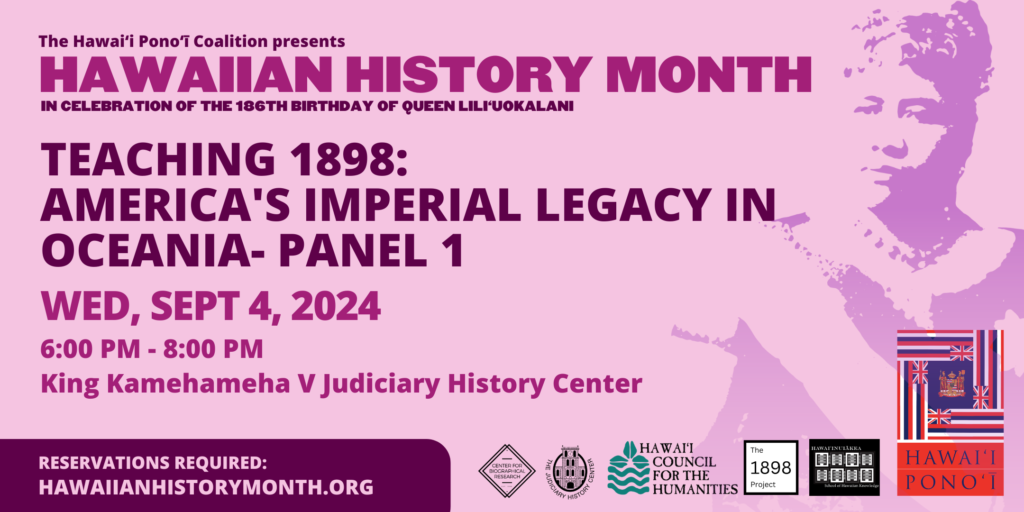
Teaching 1898: America’s Imperial Legacy in Oceania
Aliiolani Hale, 1913 Courtroom
Wednesday, September 4, 2024
6:00 to 8:00 PM
This two-part civic education discussion—”Teaching 1898: America’s Imperial Legacy in Oceania”—brings together esteemed educators to explore the historical context of America’s military and political expansion into Hawaii, the Philippines, and island nations across the Pacific. The panelists—Jonathan Osorio (Moderator), John Rosa, Vina Lanzona, Kawelau Wright, and Tammy Tabe—highlight the impacts and legacy of US Imperialism, share how they incorporate this history into their teachings, and express why civic education is crucial for an informed, empowered, and united society.
Mahalo to our program partners and cosponsors: Hawaii Ponoi Coalition, The 1898 Project, Hawaii Council for the Humanities, and Hawaiinuiakea School of Hawaiian Knowledge. The program was live-streamed and recorded by Oiwi TV.
Dr. Jonathan Kay Kamakawiwoole Osorio, PhD (Moderator)
Jonathan Kay Kamakawiwoole Osorio, a Kanaka Maoli Professor of Hawaiian studies and currently dean of Hawaiinuiakea School of Hawaiian Knowledge, is a historian of 19th and 20th century Hawaii and has authored a history of the Hawaiian Kingdom and co-edited two volumes of collected essays on contemporary Hawaiian society, known as The Value of Hawaii (2010 and 2020).
Dr. John P. Rosa, PhD
John P. Rosa is Associate Professor of History at the University of Hawaii: Manoa and the author of Local Story: The Massie-Kahahawai Case and the Culture of History (UH Press, 2014). He grew up in Kaimuki and Kaneohe.
Dr. Vina Lanzona, PhD
Vina Lanzona is an Associate Professor in History at University of Hawaii: Manoa who specializes in Colonial and Modern Southeast Asia and the Philippines.
Dr. Kawelau Wright, PhD
Kawelau Wright is an Assistant Professor at the Kamakakuokalani Center for Hawaiian Studies. Her research focuses on Hawaii land laws and land tenure during the Kingdom and Territorial periods.
Dr. Tammy Tabe, PhD
Dr. Tammy Tabe is an Assistant Professor at the Department of Pacific Islands Studies, University of Hawaii: Manoa, and Adjunct Fellow at East-West Center. She is an anthropologist who has worked widely in the Pacific Islands, specifically in Solomon Islands, Fiji, Tuvalu, and Kiribati on marine protected areas, ecosystem-based adaptation, gender inequality, identity and diaspora, and climate change-induced migration and displacement. Her primary research focuses on colonial displacement and how these forced relocations inform today’s dialogues, policies and decision-makings governing climate migration in Oceania.
Disclaimer: While the Hawaii State Judiciary provides a venue for diverse discussion, speakers’ remarks do not represent opinions of the Judiciary.
